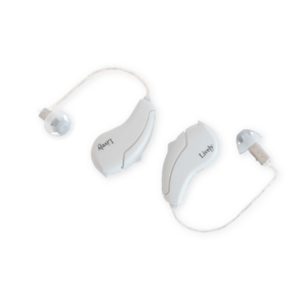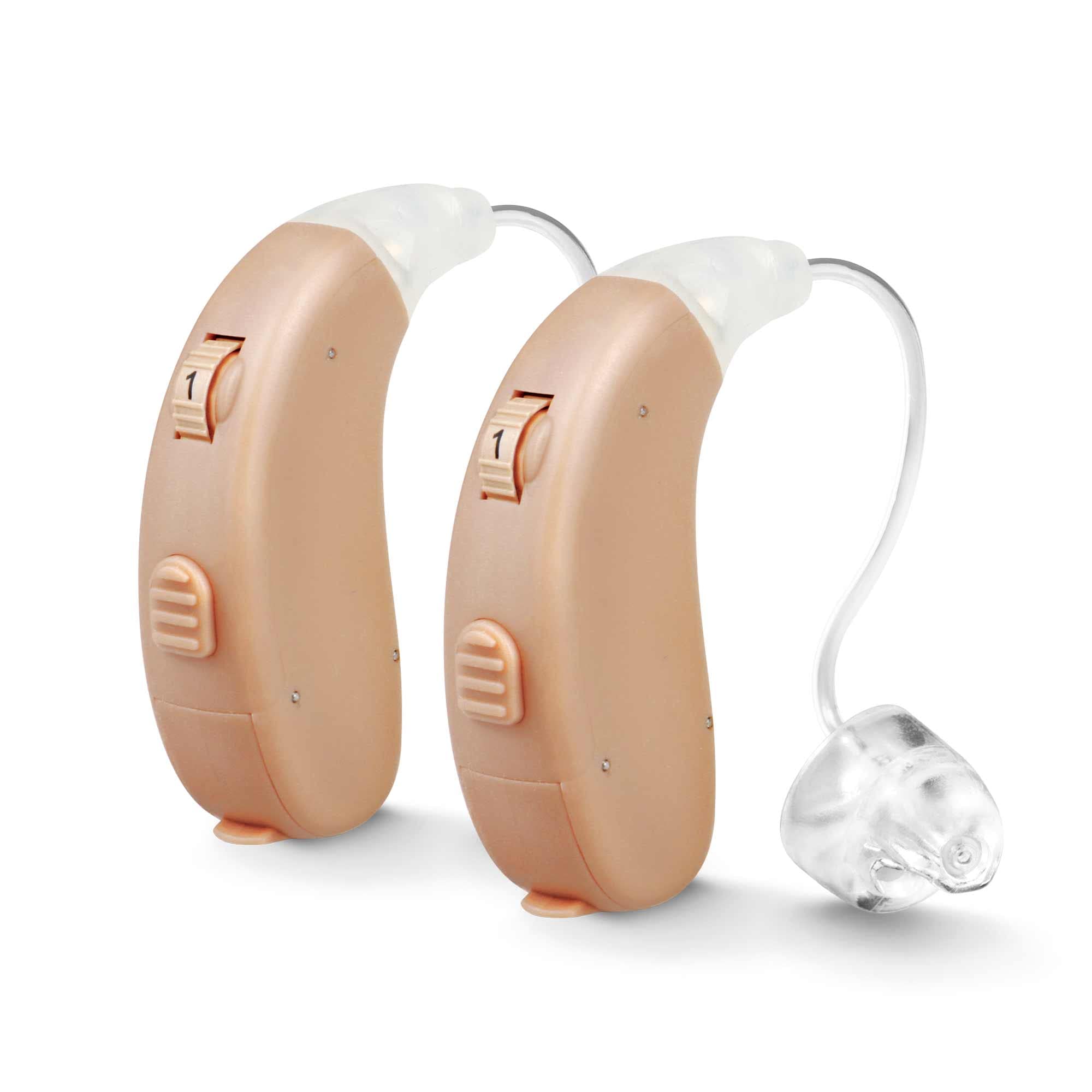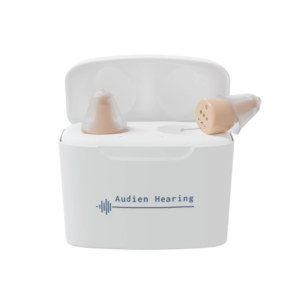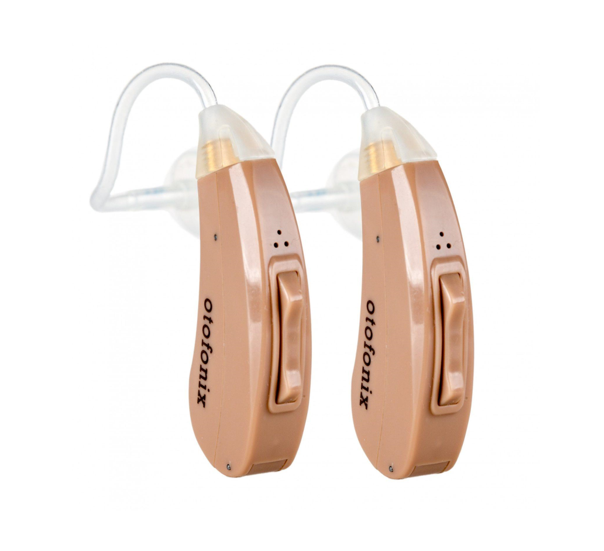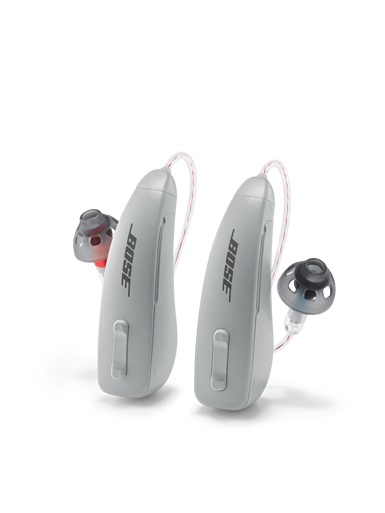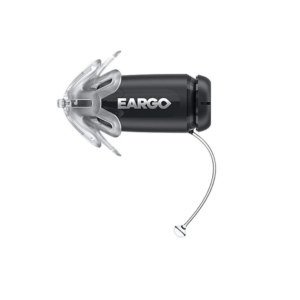Most Affordable Hearing Aids of 2023
After reviewing over 15 different hearing aids, we’ve compiled our top six affordable picks, so you can find the perfect pair for your needs, your budget, and your lifestyle.
AgingInPlace.org keeps our resources free by working as an affiliate partner with some companies mentioned on our site. These partnerships or the commission we may earn do not affect our opinions or evaluations of the products we mention. Our reviews are solely based on our research methodology and from input from our AgingInPlace.org Advisory Board. Learn more about our ad policies.
Most Affordable Hearing Aids of 2023
Products carousel
If you’ve ever searched for affordable hearing aids, you probably know that most of them aren’t cheap at all. Hearing aids prices can easily reach $3,000–$5,000 per pair, especially if you get them through your audiologist’s office. In an AgingInPlace.org survey of 1,000 hearing aid users, almost 53% of respondents answered that price was the primary reason they were hesitant to get hearing aids.
And yet, hearing aids do so much more than improve hearing loss. “Some of the greatest benefits to hearing aids is they reduce loneliness, delay dementia, and improve overall quality of life,” said Philipp Orso, head of audiology at Makehear. Our survey results confirmed this sentiment, with 87.4% of respondents saying that purchasing a hearing aid was a worthwhile purchase. Considering this, it’s about time for affordable hearing aids to become widely available. After reviewing over 15 different hearing aids, we’ve compiled our top six affordable picks, so you can find the perfect pair for your needs, your budget, and your lifestyle in 2023.
Best Inexpensive Hearing Aids on the Market
- Best Trial Period & Editor’s Choice: Jabra Enhance Select 50
- Best Basic: MDHearing Air
- Most Affordable: Audien Atom Pro
- Most Customizable: Otofonix Helix
- Best Rechargeable: Lexie B2 Powered by Bose
- Most Discreet: Eargo 5
Research and Testing Affordable Hearing Aids
At AgingInPlace.org, we research and recommend products to provide value for our readers. We’ve spent more than 4,000 hours conducting in-depth research on hearing aids. Our team evaluated affordable hearing aids across various models and versions in order to better understand their features and overall value. Our goal is to provide the most accurate feedback and recommendations for our readers.
To select our top affordable hearing aids, we did the following:
- Engaged in ongoing independent research
- Consulted with geriatricians and adult caregivers
- Mystery shopped the brands
- Surveyed hundreds of hearing aid users
- Conducted hands-on testing of various models of hearing aids
- Interviewed experts in the field
- Read hundreds of verified customer reviews from trusted third parties, like Better Business Bureau (BBB) and Consumer Reports
We then grade each hearing aid company against a 1–10 rating scale and score them in categories including comfort and fit, features, durability, warranty, pricing, customer support, audiologist care, and company credibility. See our full hearing aid review methodology for a breakdown of criteria in each category and our scoring system.
- Cost: $1,195 per pair (Basic Package); $1,395 per pair (Premium Package)
- Financing: Yes
- Trial Period: 100 days
- Warranty: Three years
- Style: Receiver-in-the-canal
- Types of Hearing Loss: Mild to moderate
- Bluetooth Capabilities: Yes
- Battery type: Rechargeable
- Hearing test: Online
- Adjustments: By smartphone app or remotely by specialist with Premium Package
Pros
-
Generous 100-day trial
-
Three-year warranty
Cons
-
More expensive among inexpensive brands
-
Not designed for severe or profound hearing loss
What makes Jabra Enhance Select stand out as a top choice for best affordable hearing aids for older adults (besides the price, of course) is the company’s generous trial process. Jabra Enhance hearing aids come with a 100-day trial period, meaning users have a full 100 days to test the devices out before deciding whether or not to keep them. That’s more than twice as long as the 45 days offered by the other hearing aid companies on our list.
Many people, older adults especially, have well-established routines and preferences. Adding a daily device like a hearing aid can be a big adjustment, and one that some users may have ups and downs with, especially if your hearing aid needs adjustment. Offering 100 days to try the product lets users experience their hearing aids in many different settings, different circumstances, even different seasons to see what it’s really like living as a hearing aid user.
SETTINGS, FEATURES, AND ADJUSTMENT
Jabra Enhance now offers all hearing aids with a Basic or Premium Package. The Premium Package comes with an online hearing test, which is used to preprogram customized hearing profiles into your devices. You can also receive remote adjustments to fine-tune your programs for three years. “Even though the lack of an in-person exam isn’t ideal, Jabra Enhance hearing aids are adjustable, which is a huge advantage over competitors like Audien and Otofonix,” said Hadassah Kupfer, Au.D, an audiologist and hearing aid specialist based in New York City. “Lively can be personalized to the user’s actual hearing loss rather than a blanket volume control across all pitches.” The Basic Package comes with three preset programs that are not adjustable.
If you’re willing to spend a bit more upfront, the ample trial period and pitch adjustability ensure that you are getting the most tailored experience available without having to physically go into an audiologist’s office.
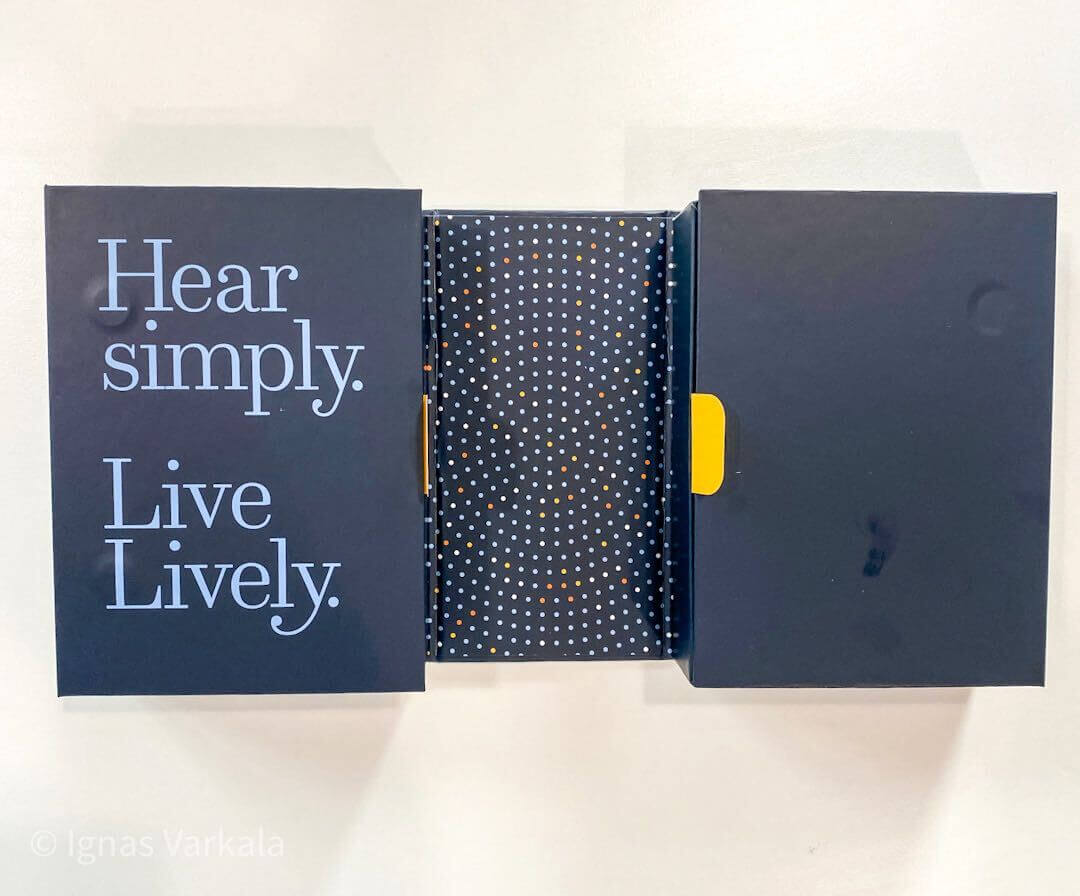
Jabra enhance Reviews
Jabra Enhance has an A+ rating on BBB and 3.63/5 stars, although there are minimal reviews on the third-party review site. On the Jabra Enhance website, the Enhance Select 50 has 4.6/5 stars out of more than 200 reviews. Overall, the reviews praise the quality of the hearing aids, comfort, and customer service.
Editor’s Choice
What Is Editor’s Choice?
Our team of editors and writers choose a product from each article that stands out based on our extensive research of the products we review. While it may not always be the highest-scoring product in the lineup, we’ve chosen the product based on its overall value to our audience.
Why We Chose This Product:
Even inexpensive hearing aids represent a significant financial investment. We believe that a longer trial period gives you the chance to be absolutely sure that your purchase is the right one, and be sure that the benefits of using the Jabra Enhance Select 50 hearing aid are worth the cost.
- Cost: $599.99 each, $299.98 per pair *current promotion
- Financing: Yes
- Trial Period: 45 days
- Warranty: One year
- Style: Behind-the-ear
- Types of Hearing Loss: Mild to moderately severe
- Bluetooth Capabilities: No
- Battery type: Disposable size 13 battery
- Hearing test: Online
- Adjustments: Remote by smartphone app or on hearing aids
Pros
-
Advanced noise reduction
-
Simple operation
Cons
-
Not waterproof
-
Limited variety of colors to match skin tones
The MDHearing AIR is an excellent all-around option if you’re looking for an affordable hearing aid with basic functionality. It’s compact and discreet compared to many larger behind-the-ear models and designed to fit comfortably with glasses thanks to its super-thin tubing. While it doesn’t have some of the more advanced features that other models do, like Bluetooth connectivity and remote operation, that’s not necessarily a bad thing. Many older adults want a low-cost hearing aid that they or their caregivers can easily operate, and this model delivers exactly that. The AIR offers a high-quality hearing aid at an incredible price—if you need two hearing aids, the current promotion is a steal.
SETTINGS, FEATURES, AND ADJUSTMENT
With the MDHearing AIR, the four program settings simplify adjustment so you can quickly and easily set your hearing aid to the ideal setting for your environment. Setting selection is operated by the single “program” button on the back of each hearing aid, and volume is adjusted using the easy spin dial. This hearing aid allows you to adapt to your surroundings, choose your desired volume, and focus on conversations with friends and family uninterrupted by background noise and whistling sounds.
TIP: It’s important to note that the MDHearing AIR and a few more on our list are not water-resistant hearing aids. Avoiding water damage can be simplified by keeping a clean, dry container anywhere you may need to quickly place them before activities like bathing or swimming where your ears may be submerged or exposed to excessive moisture.
MDHearing Reviews
An analysis of consumer reviews shows that MDHearingAid as a brand has 3.8/5 stars on the BBB and a B rating. On the brand’s website, the AIR specifically has approximately 4.3/5 stars out of more than 2,000 reviews, with many users praising the affordability and clarity of sound.
- Cost: $249 per pair
- Financing: No
- Trial Period: 45 days
- Warranty: Limited one-year warranty comes with purchase, lifetime protection for $4 per month
- Style: In-the-canal
- Types of Hearing Loss: Mild to moderate
- Bluetooth Capabilities: No
- Battery type: Rechargeable
- Hearing test: None required
- Adjustments: Not available
Pros
-
Inexpensive for a pair
-
Small devices fit in canal
-
Cheap lifetime protection plan
Cons
-
No Bluetooth options
-
Mixed consumer reviews
For the most inexpensive hearing aid cost on the market, look no further than Audien. The Audien Atom Pro is the brand’s latest, most advanced option offering a nearly invisible design, enhanced feedback cancellation to eliminate annoying whistling sounds, and Audien’s “Atom” sound technology. This model also comes with a portable charging case to charge your hearing aids on-the-go whenever you need to.
The Audien Atom Pro is certainly budget-friendly, and because Audien doesn’t require you to undergo a hearing test before purchasing, older adults with moderate hearing loss who want a simple solution may benefit. But if you have more serious hearing loss, you may want to consider having a professional hearing assessment to be sure you’re choosing the right hearing aid. It’s also important to consider your lifestyle and where you most need hearing enhancement. This low-cost model is great for amplifying sound but doesn’t do much for background noise cancellation, so it’s not an ideal choice for those looking to focus on conversations in noisy environments.
AGINGINPLACE.ORG TESTING INSIGHT
Another important consideration with the Atom Pro is its nearly invisible size and color. This is an ideal option for older adults who don’t want an obvious hearing aid, and it can be easily worn with glasses because it sits entirely inside of the ear. However, this design can be particularly difficult for those with limited finger dexterity, decreased hand and finger sensation, or arthritis as they require a fine, pinch-type motion to insert and remove.
When testing the product, we found that while adjusting the volume was simple and done by a small screw on the back of the hearing aid, a caregiver or family member may have to help if you have hand or finger mobility issues. Also, if you or your loved one can be forgetful at times, keep in mind that this hearing aid can be easily lost if it’s put anywhere other than in the case. We loved this charging case during our testing and found it super easy to use. It holds enough power for up to three charging cycles, and it clearly indicates when the hearing aids are charged with a green light. It’s about the size of a Tic Tac box, making it easy and discreet to bring with you anywhere.
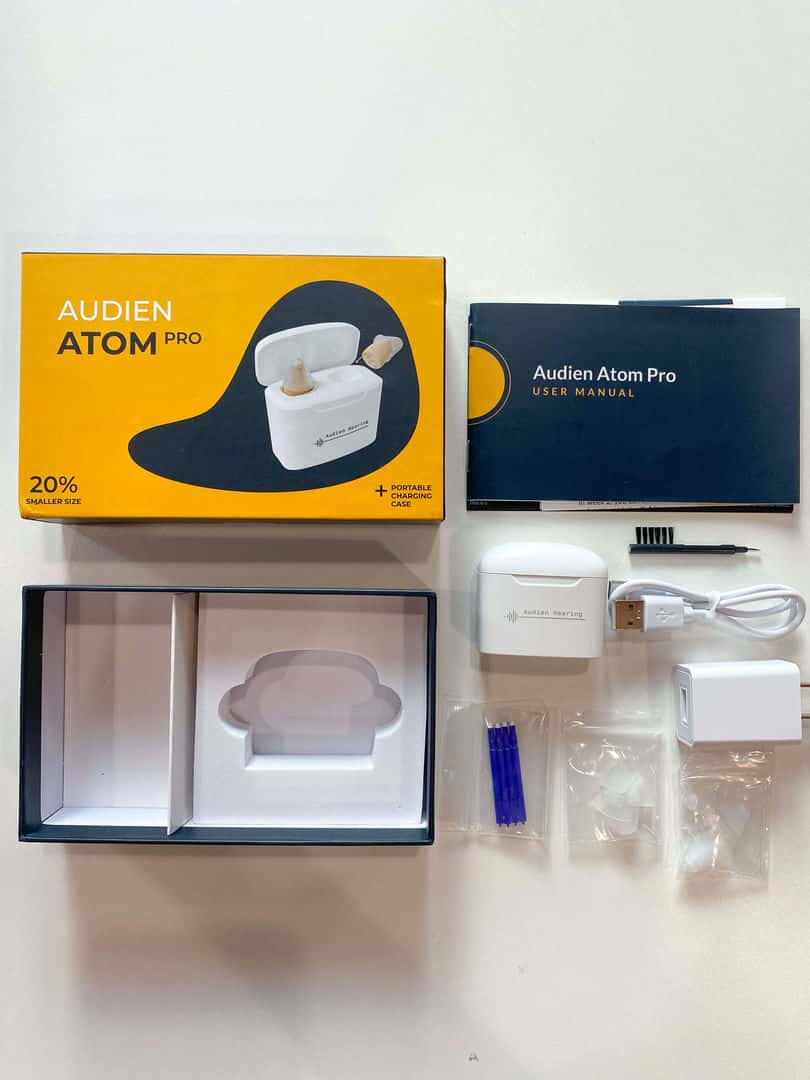
Audien Reviews
Audien as a brand on BBB has a B rating and 4.17/5 stars from consumers. On *Trustpilot, the brand has 4.3/5 stars with 66% of reviews being “excellent” or “good” and 30% falling under “poor” or “bad.” Many of the complaints from both review sites are about customer service, while some complain about the hearing aid not fitting correctly or poor sound quality. However, most mentions of the Atom Pro specifically are positive, with consumers appreciating the affordability and amplified sound quality.
*Trustpilot’s scoring platform doesn’t simply collect an average of reviews but is affected by three main factors: Recent reviews weigh more heavily than older ones; companies that collect reviews more frequently will have a more consistent score; and to ensure balance for companies with fewer reviews, Trustpilot automatically includes the value of seven reviews worth 3.5 stars in all calculations.
- Cost: $695 per pair
- Financing: Yes
- Trial Period: 45 days
- Warranty: 12 months
- Style: Behind-the-ear
- Types of Hearing Loss: Mild to moderate
- Bluetooth Capabilities: No
- Battery type: Rechargeable
- Hearing test: None required
- Adjustments: Not available
Pros
-
Easier to modify fit and amplification than competitors
-
Designed to meet FDA requirements
Cons
-
Not designed for severe or profound hearing loss
Compared to other models on our list, we love how you can customize the Otofonix Helix for fit, volume, and settings as soon as you get them. Each kit comes with the standard charging station, travel case, and cleaning supplies, but it also includes multiple dome styles and sizes, different sized sound tubes, and an ear hook kit. By including these in the purchase, particularly the sound tubes and ear hooks, Otofonix allows users to tweak their hearing aids to achieve another 10 decibels of amplification without professional assistance. This amount of customization is rare in cheaper hearing aid models.
SETTINGS AND FEATURES
This model has four settings for conversation, restaurants, TV, and outdoors, and 10 volume settings to further fine-tune your hearing experience. Settings and volume are easily changed by buttons right on the hearing aid, with one to four beeps indicating which program is selected. Dual directional microphones pick up clear sounds in front of the user, like speech or TV, and offer excellent background noise cancellation—allowing you to focus on what you want to hear without distractions.
TIP: When your new hearing aids arrive, try to use them in as many different scenarios as you can during the trial period (45 days for Otofonix). Even if you don’t go to restaurants or to a movie often, doing so within the return window ensures that you don’t have any surprises after they’re no longer eligible for return.
Otofonix Reviews
On Amazon, the Otofonix Helix has 3.6/5 stars, but there were minimal reviews and none found on other third-party review sites. Out of the reviews on Amazon, most people were happy with the fit, price, and sound, while several complaints mentioned experiencing some feedback.
- Cost: $999 per pair
- Financing: Yes
- Trial Period: 45 days
- Warranty: 12 months
- Style: Receiver-in-the-canal
- Types of Hearing Loss: Mild to moderate
- Bluetooth Capabilities: Yes
- Battery Type: Rechargeable
Hearing Test: Online
Pros
-
Subscription option helps with affordability
-
Uses Bose sound technology
Cons
-
No 24/7 customer support
The Lexie B2 Powered by Bose is Lexie’s newest model and an excellent option if you’re looking for affordable and rechargeable hearing aids. This model includes a protective charging case, and one full charge offers up to 18 hours of listening time per hearing aid. The Lexie B2 is Lexie’s second model since partnering with Bose to offer customers a trusted and reliable name in sound technology at an affordable price point. It’s also available over-the-counter at nationwide retailers like Walmart, Best Buy, and Walgreens.
This model is moisture resistant, and users are able to customize fit with a variety of dome sizes and style options. It comes with modern hearing technology features, like directional microphones, feedback management, background noise reduction, and Bluetooth connectivity to the Lexie smartphone app. Through the app, users can adjust volume and sound settings, program customized listening environments, and contact customer support.
SUBSCRIPTION OPTION
Instead of purchasing your Lexie hearing aids in full, Lexie Hearing offers a subscription option that breaks the expense into monthly payments over the course of 24 months. The subscription requires an initial startup fee followed by 23 equal monthly payments and includes your pair of hearing aids as well as a Care Kit with enough supplies to maintain the hearing aids for the full two years. After 24 months and completing your payments you own your hearing aids, but prior to that the devices are considered rentals. Should you decide to return your Lexie hearing aids before the end of your 24-month subscription but after the 45-day trial period, you will no longer be liable for further monthly payments, but you will also not be eligible for any refunds.
LEXIE REVIEWS
Lexie has an A+ rating on BBB with an impressive consumer review score of 4.67/5 stars, with just three complaints filed and resolved over the past three years. Lexie Hearing is also relatively well-reviewed on Trustpilot, with 3.4/5 stars and most customers mentioning excellent product quality and dramatically improved hearing.
- Cost: $1,850 per pair
- Financing: Yes
- Trial Period: 45-day return policy
- Warranty: One year
- Styles: Completely-in-the-ear
- Types of Hearing Loss: Mild to moderate high-frequency hearing loss without complications
- Bluetooth Capabilities: No
- Battery type: Rechargeable
- Hearing test: Online
- Adjustment: Remote through smartphone app or with assistance from company
Pros
-
Virtually invisible
-
Natural sound and feel
Cons
-
16-hour battery life
-
Small size can be difficult to manipulate
When it comes to discreet hearing aids, Eargo has a definite corner in the market. The company’s innovative, medical-grade silicone fiber hearing aid is virtually invisible. Unlike other completely-in-the-ear hearing aids, the Eargo was modeled after a fishing fly. Odd as it sounds, the silicone “wings” on the device enable it to sit suspended in the ear canal, which allows air to flow naturally in and out of the ear for a more natural feel.
It’s worth noting that this style of hearing aid can be a bit awkward for those whose family members or caregivers manage their hearing devices. The completely-in-the-canal design often needs a little wiggling and manipulation to fit perfectly in the canal, and it’s hard to get the perfect fit and position if you’re not doing it yourself.
FEATURES
These rechargeable hearing aids only hold their charge for about 16 hours, which is less than most other rechargeable models. While the overall battery life is a little short, we do like the “quick charge” feature that gives the Eargo 5 two to three hours of battery life after just 30 minutes of charging. These hearing aids have the latest technology you’re looking for to get crisp, clear sound, like directional microphones for focusing on desired sounds and background noise cancellation. It’s worth noting that the Eargo 5 is not waterproof, so it’s not the model for swimmers or water sports enthusiasts.
TIP: During our recent hearing aid research summit, one focus group participant reported a similar style hearing aid getting stuck in her ear. It was so stuck that she had to visit her audiologist the next day to remove it! Bottom line: We love this style for being nearly invisible, but we recommend larger or more substantial styles for anyone who has significant trouble with fine motor use of the fingers and hands.
Eargo Reviews
On BBB, Eargo has an A- rating and consumer review of 4.17/5 stars. On Trustpilot, Eargo has 4.8/5 stars. Complaints are focused on poor customer service, but with some people not seeming to understand return policies and warranty coverage. Some complaints were that the hearing aid didn’t fit well or was defective. Consumers who gave positive feedback praised the overall fit and quality and appeared happy with the service they received.
Why Are Hearing Aids So Expensive?
There is a lot that goes into designing and manufacturing high-quality hearing aids. Hearing aids are sold at higher prices due to the continuous research and development that goes on to improve the technology that makes them smaller and more powerful and able to amplify sound more naturally.
A smaller portion of the cost comes from the professional overhead required to conduct hearing tests, fit users with the devices, and adjust them to individual health considerations. Other professional features may include hearing aid selection and recommendations, significant adjustments needed for clarity or individual preference, verification that the devices are meeting hearing needs, and periodic service for cleaning and checking the functionality of all hearing aid parts.
How to Choose the Affordable Hearing Aid for You
Before you purchase hearing aids, you want to be sure you’re making the right choice. Here are some questions to help you narrow down your selection when shopping for hearing aids:
- Do I need one hearing aid or two? Many people experience hearing loss in only one ear or are in different stages of hearing loss in each ear where only one may need a hearing aid.
- Which hearing aid style is recommended for my type of hearing loss? Different hearing aids are tailored to varying levels of hearing loss (e.g., moderate vs. profound).
- What feature preferences and needs do I have to enhance my hearing aid experience (e.g., enhanced music listening, wind noise reduction, ability to stream phone calls and podcasts, directional microphones, etc.)?
- Do I have issues that may hinder my ability to operate the hearing device’s programs (e.g., vision loss, manual dexterity issues, etc.)?
- What sort of trial period and warranties come with the hearing aids?
- How important is customer service? Can I easily get in touch with a customer service representative if I have any questions or issues? Will the online hearing aid be difficult to learn how to use on my own?
Comparing the Cheapest Hearing Aids
| Jabra Enhance Select 50 | MDHearing Air | Audien Atom Pro | Otofonix helix | Lexie B2 Powered by Bose | Eargo 5 | |
|---|---|---|---|---|---|---|
| Price | $1,195 or $1,395 per pair (depending on package) | $299.98 per pair | $249 per pair | $695 per pair | $999 per pair | $1,850 per pair |
| Financing | ||||||
| Type of Hearing Aid | Receiver in Canal | Behind the Ear | Completely in the Canal | Behind the Ear | Receiver in the Canal | Completely in the Canal |
| Type of Hearing Loss | Mild to Moderate | Mild to Moderate | Mild to Moderate | Mild to Moderately Severe | Mild to Moderate | Mild to Moderate |
| Rechargeable Battery | ||||||
| Water Resistant | ||||||
| Directional Microphones | ||||||
| Noise Reduction | ||||||
| Adjustment | Remote by smartphone app or mail-in | Remote by smartphone app | None | None | User-adjustable by phone app | Remote through Eargo support |
| Bluetooth | ||||||
| Trial Period | 100 days | 45 days | 45 days | 45 days | 45 days | 45 days |
| Warranty | 3 years | 90 days | Limited one-year warranty comes with purchase, lifetime protection available for $4 per month | 12 months | 12 months | 12 months |
| Price | Jabra Enhance Select 50 | $1,195 or $1,395 per pair (depending on package) | MDHearing Air | $299.98 per pair | Audien Atom Pro | $249 per pair | Otofonix helix | $695 per pair | Lexie B2 Powered by Bose | $999 per pair | Eargo 5 | $1,850 per pair |
|---|
| Financing | Jabra Enhance Select 50 | MDHearing Air | Audien Atom Pro | Otofonix helix | Lexie B2 Powered by Bose | Eargo 5 |
|---|
| Type of Hearing Aid | Jabra Enhance Select 50 | Receiver in Canal | MDHearing Air | Behind the Ear | Audien Atom Pro | Completely in the Canal | Otofonix helix | Behind the Ear | Lexie B2 Powered by Bose | Receiver in the Canal | Eargo 5 | Completely in the Canal |
|---|
| Type of Hearing Loss | Jabra Enhance Select 50 | Mild to Moderate | MDHearing Air | Mild to Moderate | Audien Atom Pro | Mild to Moderate | Otofonix helix | Mild to Moderately Severe | Lexie B2 Powered by Bose | Mild to Moderate | Eargo 5 | Mild to Moderate |
|---|
| Rechargeable Battery | Jabra Enhance Select 50 | MDHearing Air | Audien Atom Pro | Otofonix helix | Lexie B2 Powered by Bose | Eargo 5 |
|---|
| Water Resistant | Jabra Enhance Select 50 | MDHearing Air | Audien Atom Pro | Otofonix helix | Lexie B2 Powered by Bose | Eargo 5 |
|---|
| Directional Microphones | Jabra Enhance Select 50 | MDHearing Air | Audien Atom Pro | Otofonix helix | Lexie B2 Powered by Bose | Eargo 5 |
|---|
| Noise Reduction | Jabra Enhance Select 50 | MDHearing Air | Audien Atom Pro | Otofonix helix | Lexie B2 Powered by Bose | Eargo 5 |
|---|
| Adjustment | Jabra Enhance Select 50 | Remote by smartphone app or mail-in | MDHearing Air | Remote by smartphone app | Audien Atom Pro | None | Otofonix helix | None | Lexie B2 Powered by Bose | User-adjustable by phone app | Eargo 5 | Remote through Eargo support |
|---|
| Bluetooth | Jabra Enhance Select 50 | MDHearing Air | Audien Atom Pro | Otofonix helix | Lexie B2 Powered by Bose | Eargo 5 |
|---|
| Trial Period | Jabra Enhance Select 50 | 100 days | MDHearing Air | 45 days | Audien Atom Pro | 45 days | Otofonix helix | 45 days | Lexie B2 Powered by Bose | 45 days | Eargo 5 | 45 days |
|---|
| Warranty | Jabra Enhance Select 50 | 3 years | MDHearing Air | 90 days | Audien Atom Pro | Limited one-year warranty comes with purchase, lifetime protection available for $4 per month | Otofonix helix | 12 months | Lexie B2 Powered by Bose | 12 months | Eargo 5 | 12 months |
|---|
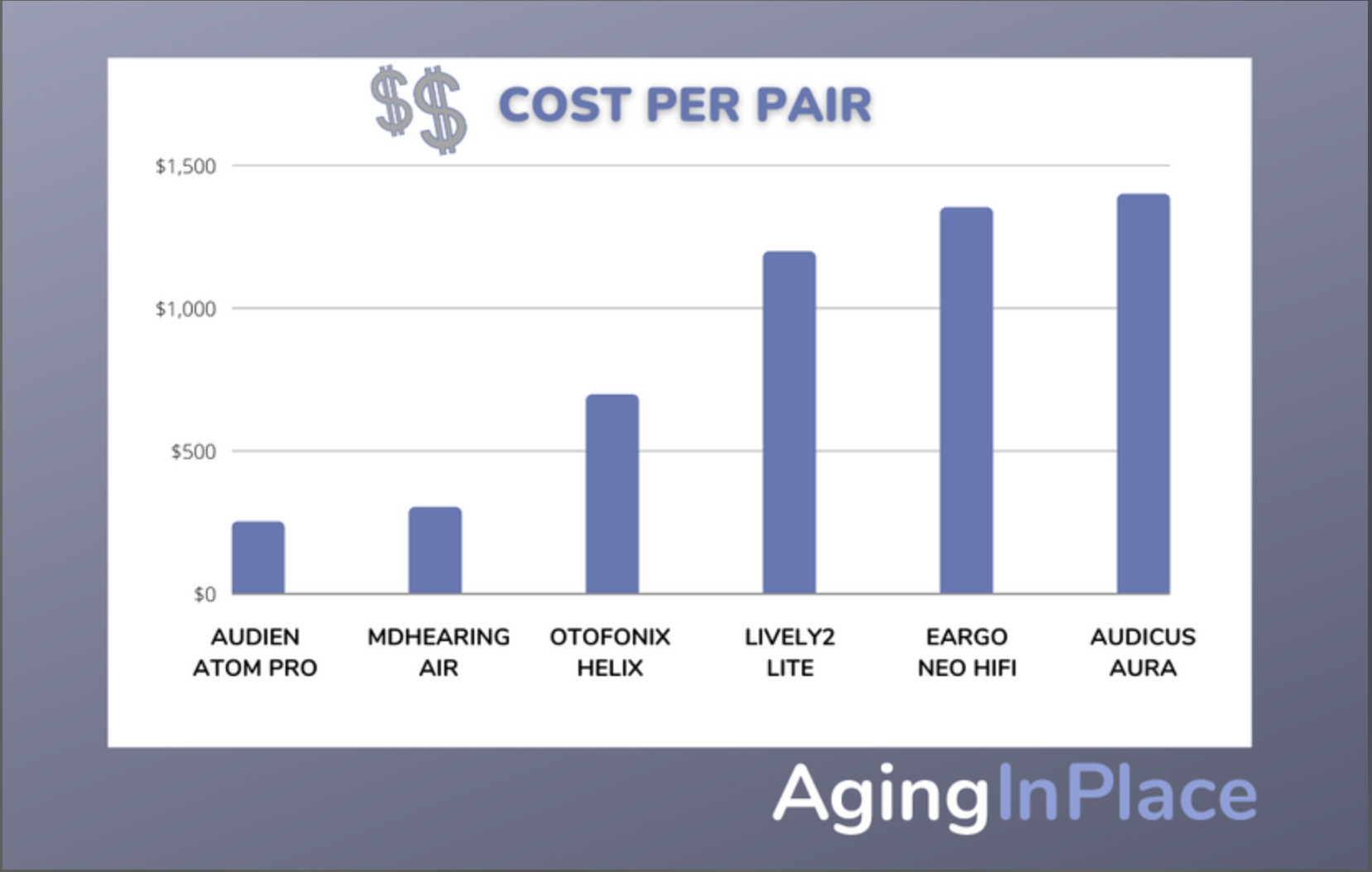
Hearing Aids vs. Hearing Amplifiers
Personal sound amplification products (PSAPs), also referred to as hearing amplifiers, often show up in searches for cheap or affordable hearing aids. With prices starting at well under $100, PSAPs may seem like a budget-conscious solution for hearing loss, but it’s important to recognize the difference between hearing amplifiers and hearing aids. Hearing amplifiers do exactly what they say—amplify sound and nothing more. A PSAP will increase the volume of sounds coming into your ear, but this simple technology is actually best suited for people with normal, unaffected hearing.
Hearing aids on the other hand are much more complex. As FDA-regulated class 1 medical devices, hearing aids use advanced sound technology to address hearing concerns specific to your individual hearing loss. Often, one person’s hearing impairment can vary across a range of tones, pitches, and environments, and simple amplification is not likely to make sounds any more clear or comprehensible. Even the cheapest, simplest hearing aids are more complex than PSAPs, so expect your price point for quality options to start closer to $300 per pair.
Inexpensive Hearing Aids Are Not Better
There are more inexpensive hearing aids on the market than the ones we’ve mentioned, but beware of the quality. For example, Bossa’s TX-5 hearing aid model is a popular option sold on Alibaba.com for a low price of $30–$35 per piece. However, 68 customers rated Bossa hearing aids at an average of 2.13/5 stars on BBB due to poor customer service and shipping accountability. When shopping for low-cost hearing devices, review the brand and product thoroughly before purchasing. We haven’t yet found quality hearing aids under $100 in our research.
How to Save Money on Hearing Aids
Even the best inexpensive hearing aids can still be a significant health-related expense, ringing in anywhere from a few hundred dollars to a few thousand. Here are all the ways you can make sure you’re getting the best prices on whichever model you choose.
Insurance: Unfortunately, Medicare and private health insurance coverage often isn’t available for hearing aids, but terms vary by state. However, some health insurance providers and Medicare Advantage plans may cover a portion of the cost. Check with your provider to find out what benefits your plan offers.
Discounts: Like many other products, hearing aids are often offered from the manufacturer or retailers at a discount or as part of a promotion. If you’re in the market for affordable hearing aids, it’s worth browsing around to see which brands are currently offering discounts.
Financing: Many hearing aid companies, including those on our list, offer special financing with little or no interest, which can make the devices much more affordable than paying the entire amount up front. This is usually done through partnership with third-party financing companies, like Affirm and Care Credit, known for flexible approval and easy payments.
Online: Buying cheap hearing aids online doesn’t have to mean lower quality, and many trusted and reputable hearing aid brands offer direct-to-consumer sales. The often much-higher cost of getting hearing aids through your audiologist can largely be attributed to manufacturer fees, retail markups, and office visit costs, all of which are removed by purchasing directly online.
Other coverage or discounts: You may be able to get discounts or other benefits such as a free hearing check-up through the AARP Hearing Care Program. Check if the program is available in your state. According to Dr. Kupfer, Medicare will cover a hearing test once per year for diagnostic purposes, but there may be a co-pay. Financial assistance may also be available through local civic organizations, such as the Kiwanis or Lions Clubs and labor unions or Veterans Affairs, if applicable.
Over-the-counter hearing aids: Hearing aids are available over-the-counter as of October of 2022, increasing access to hearing technology for the public for those with mild to moderate perceived hearing loss. The final FDA ruling outlining the sale and regulation of OTC hearing aids removed the requirement of a prescription from an audiologist, which also eliminates expensive overhead that’s usually rolled into the price of prescription hearing aids. OTC hearing aid sales means that many hearing aid companies can offer FDA-regulated devices at significantly lower prices.
Bottom Line for Choosing the Best Affordable Hearing Aids
According to the National Institute on Deafness and Other Communication Disorders (NIDCD), one-third to one-half of older adults would benefit from hearing aids. And yet, despite the benefits they provide, only about a third of older adults have ever used hearing aids, according to calculations by NIDCD Epidemiology and Statistics Program from the annual National Health Interview Survey. Hearing aids are an investment for your overall health and wellness. Our selection of the best affordable hearing aids are carefully researched and considered to bring you the best quality options at a variety of prices to fit your budget.
Wearing hearing aids can improve your social life, your self-esteem, and your enjoyment of daily activities almost immediately. While you can’t undo the damage that has already been done to the hearing nerve, wearing hearing aids can slow down the decline of speech understanding by stimulating the auditory nerve and the brain, noted Dr. Orso. The sooner you can aid hearing loss, the better the long-term outcome.
Frequently Asked Questions
-
It is possible to find a good pair of inexpensive hearing aids. In fact, our list of best affordable hearing aids includes reputable brands, many of which have been in the hearing aid business for decades. Hearing aid manufacturers spend a lot of money in research and development to improve comfort and technology of hearing aids, which comes at a price. Be prepared to spend at least a couple hundred dollars. In the end, it’ll be worth the investment. With proper care, your hearing aids can last up to seven years.
-
The chances of finding free hearing aids are slim, but it is possible to get financial assistance from nonprofits or civic organizations such as Kiwanis and the Lions Club.
-
Most of the expense that goes into hearing aids comes from research and development used to improve the size, power, and hearing sound quality of the devices.
-
While it is possible to find hearing aids online for under $100, spending a little more on reputable hearing aid brands gives you the added benefit of better quality and warranties, along with more features.
In fact, ultra cheap hearing aids can actually be a waste of money. Inexpensive hearing aids cannot separate voices from background noise and instead amplify all noises, rendering them useless in many situations. They are also less likely to fit properly and may feel uncomfortable, which means they’re less likely to be worn.
Dr. Kupfer said: “As I like to tell patients, just because something looks like a hearing aid on the outside, doesn’t mean that it actually is! The outside of the hearing aid is just plastic. The main difference in quality has to do with the computer chip on the inside, and how ‘smart’ it is at making the sound clear and comfortable automatically, from situation to situation.”
She also noted that hearing aids often end up unworn in the drawer because they aren’t the right device for the user or weren’t taught how to use it properly. “So, if an older adult is not happy with their devices, they should return them by the end of the trial period and try another product or vendor.”
-
Basic Medicare does not cover the cost of hearing aids, but some Medicare Advantage plans may cover a portion of the cost. Check with your provider to see whether your plan offers any hearing aid benefits.
Other Hearing Aids Guides
- Best Hearing Aids
- Best Small Hearing Aids
- Best Invisible Hearing Aids
- Best Over-The-Counter Hearing Aids
- Best Hearing Aids for Tinnitus
- In-The-Ear Hearing Aids Review
- Best Rechargeable Hearing Aids
- Best Bluetooth Hearing Aids
- Best Cheap Hearing Aids
- Best TV Listening Aids for the Hearing Impaired
- Best Hearing Amplifiers
Learn More About Hearing Aids
Jennifer Walker-Journey contributed to this report.
WRITTEN BY
With over six years of clinical experience in long term care and rehabilitation, Ayla is passionate about helping people age safely and with dignity. She is an LPN (Licensed Practical Nurse), licensed with the State Board of Nursing in Massachusetts, and holds a B.A. in Psychology. Through her education and work she has focused on combining practical health knowledge with the individual needs and desires of older adults to bring the absolute best care and content to patients and readers.
View AuthorMEDICALLY REVIEWED BY
Dr. Kupfer is an Audiologist and Hearing Aid Specialist in NYC, where she works with adults and older adults daily. In addition to diagnosing hearing loss, tinnitus and fitting cutting-edge hearing aids in her private practice, she serves as adjunct clinical faculty for the CUNY Audiology Doctoral Program.
View Reviewer- Age-Related Hearing Loss | National Institute on Deafness and Other Communication Disorders
- Financial Assistant | Hearing Loss Association of America
- Hearing Aids Improve Quality of Life | Hear-it.org
- How Does Hearing Loss Affect the Brain? | Aging Health
- Why Do People Fitted With Hearing Aids Not Wear Them? | International Journal of Audiology
- Quick Statistics About Hearing | National Institute on Deafness and Other Communication Disorders
- Hearing Aids and Personal Sound Amplification Products: What to Know | U.S. Food and Drug Administration
Do you want to cite this page? Use our ready-made cite template.

